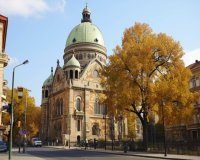The Revival of Jewish Culture in Modern-Day Budapest

The Revival of Jewish Culture in Modern-Day Budapest
Budapest, the capital of Hungary, has a rich and diverse history that spans centuries. Among the many cultural facets that have contributed to the city's unique identity, the revival of Jewish culture holds a special place. In recent years, Budapest has seen a resurgence of Jewish heritage, traditions, and art that is thriving in the heart of this beautiful city.
The Jewish community in Budapest has a long and storied history dating back to the Roman times. Over the centuries, the community has faced both periods of prosperity and hardship. During World War II, Hungary's Jewish population suffered greatly, with many deported and killed in concentration camps.
However, in the post-war years and especially since the fall of communism in 1989, Budapest has witnessed a remarkable revival of Jewish culture. Here are some of the key aspects of this revival:
Jewish Heritage Sites
Budapest is home to several significant Jewish heritage sites that serve as a reminder of the city's Jewish history. One of the most prominent is the Dohány Street Synagogue, also known as the Great Synagogue. It is the largest synagogue in Europe and a symbol of the city's Jewish heritage. Visitors can explore its beautiful architecture and the adjacent Jewish Museum, which offers insight into the history and traditions of Hungarian Jewry.
Another notable site is the Holocaust Memorial Center, which documents the Holocaust in Hungary and honors its victims. The center provides a sobering reminder of the atrocities committed during that dark period of history.
Jewish Festivals and Events
Budapest hosts a variety of Jewish festivals and events throughout the year. These celebrations showcase Jewish culture through music, dance, food, and art. The Budapest Jewish Summer Festival is a highlight, featuring concerts, exhibitions, and culinary delights. It's a fantastic opportunity for both locals and tourists to immerse themselves in Jewish traditions.
Kosher Cuisine
One of the most delicious aspects of the Jewish revival in Budapest is the burgeoning kosher food scene. Numerous restaurants and cafes now serve authentic Jewish dishes, from classic matzo ball soup to mouthwatering kosher pastries. Visitors can savor these culinary delights while experiencing the flavors of Jewish culture.
Jewish Arts and Culture
The revival of Jewish culture in Budapest extends to the arts. Contemporary Jewish artists, writers, and musicians are gaining recognition on the international stage. Galleries and cultural institutions in Budapest regularly feature exhibitions and performances that explore Jewish themes and creativity.
Jewish Education and Community
Budapest is also home to Jewish educational institutions and a thriving community. Jewish schools and cultural centers play a crucial role in preserving traditions and passing them on to future generations. Additionally, the Jewish community in Budapest is actively engaged in interfaith dialogue and community outreach, fostering tolerance and understanding.
In conclusion, the revival of Jewish culture in modern-day Budapest is a testament to the resilience and vibrancy of the city's Jewish community. Through heritage sites, festivals, cuisine, arts, and education, Budapest celebrates its rich Jewish history and embraces a promising future. Visitors to this magnificent city can explore and partake in the many facets of Jewish culture, contributing to a more diverse and culturally enriched Budapest.
Budapest: The Great Synagogue Skip the Line Ticket
Explore Budapest's Great Synagogue, the largest synagogue in Europe and second-largest in the world, with a skip-the-line ticket. Your guided tour takes you through the history and architecture of this significant site, shedding light on the fate of Hungarian Jews before and after WWII. Start your tour at the security check, bypassing the lines, and delve into the Heroes’ Temple, the graveyard, and the Jewish Museum.
Admire the intricate details of the Synagogue, including the Emanuel Memorial Tree in the Raoul Wallenberg Memorial Park, a poignant tribute to Holocaust victims. Visit the Hungarian Jewish Museum adjacent to the Synagogue, showcasing everyday objects that reflect the lives of Hungarian Jews. The museum's red and yellow brick facade, blending Romantic and Moorish elements, adds to the experience.
During your visit, honor those who perished in the ghetto during WWII at the graveyard behind the Heroes’ Temple. Please dress appropriately for the temple, as sleeveless tops, short skirts, and shorts are not allowed. Men must cover their heads; a kippah is provided at the entrance. Note that backpacks larger than hand luggage are not permitted, and there is a mandatory security check upon entry.
Highlights:
- Guided tour of the Great Synagogue, Heroes’ Temple, and Jewish Museum
- Explore the Raoul Wallenberg Memorial Park and graveyard
- Visit the Hungarian Jewish Museum with its unique architectural blend
- Pay respects at the Emanuel Memorial Tree honoring Holocaust victims
Important Information:
- The Synagogue is closed on Saturdays and Jewish holidays.
- Face masks are recommended but not mandatory.
- The ticket office and entrance close one hour before visiting hours end.
Meeting Point:
Present your voucher directly at the security check at Dohány Street Synagogue.
Price: From $24.98 per person
Language Options: Spanish, English, French, German, Hebrew, Hungarian, Italian, Russian
Duration: Approximately 2-3 hours
Experience the rich history and poignant memorialization of Budapest's Jewish community at the Great Synagogue. Book your skip-the-line ticket now for a profound and insightful tour.
Historical Background and Heritage of Budapest
Budapest, the capital of Hungary, is a city steeped in history and brimming with cultural heritage. Its rich past and diverse influences have shaped the city into the vibrant and unique metropolis it is today. In this article, we will delve into the historical background and heritage of Budapest, exploring its roots, key historical events, and the cultural treasures that make it a remarkable European city.
The Early Foundations
The history of Budapest dates back over a thousand years. The city's origins can be traced to the Roman era when the settlement of Aquincum was established. It served as an important Roman provincial capital and played a significant role in the region's trade and governance.
During the Middle Ages, Buda and Pest, the two cities on either side of the Danube River, developed independently. Buda, with its royal palace, and Pest, a bustling trading hub, each had their distinct character and historical significance.
The Ottoman Era
In the 16th century, Budapest fell under Ottoman rule, marking a period of profound transformation. The Ottomans left their architectural imprint on the city, evident in the Turkish baths and mosques that still stand today. The Turkish influence is a testament to Budapest's rich and diverse heritage.
Habsburg Rule and the Austro-Hungarian Empire
The 18th and 19th centuries saw Budapest flourish as a center of culture and commerce under Habsburg rule and the Austro-Hungarian Empire. The Hungarian National Museum, Hungarian State Opera House, and numerous grand buildings and bridges were constructed during this time, adding to Budapest's architectural splendor.
The Struggles of the 20th Century
Budapest faced immense challenges during the 20th century, including World War I, World War II, and the Hungarian Revolution of 1956. These events left their mark on the city's history, with scars and memorials that serve as reminders of the resilience of its people.
Modern Budapest
Today, Budapest is a thriving and dynamic European capital, known for its architectural marvels, vibrant arts scene, and world-famous thermal baths. The city's historical heritage is on full display as visitors stroll through the Buda Castle District, cross the iconic Chain Bridge, or relax in the historic Széchenyi Thermal Bath.
Cultural Heritage
Budapest's cultural heritage is a mosaic of influences from various periods and civilizations. Its cuisine, for example, reflects a blend of traditional Hungarian, Jewish, and Austrian flavors. Goulash, a Hungarian staple, is a must-try dish for visitors.
The city's museums, galleries, and theaters showcase the depth of its cultural heritage. The Hungarian National Museum, the Museum of Fine Arts, and the Hungarian State Opera House are just a few of the cultural institutions that celebrate Budapest's artistic legacy.
Conclusion
In conclusion, Budapest's historical background and heritage are integral to its identity as a captivating European capital. From its Roman origins and Ottoman influence to its grand Habsburg-era buildings and the challenges of the 20th century, the city's history is a tapestry of resilience and cultural richness. Budapest continues to thrive as a city that honors its past while embracing its vibrant present.
Budapest: Jewish Heritage Guided Tour with Synagogue Ticket
Explore the rich Jewish history and heritage of Budapest with this captivating walking tour. Visit iconic landmarks including the Dohany Street Synagogue, the Jewish Museum, the Holocaust Cemetery, and the poignant Raoul Wallenberg Memorial Park.
About this Activity
Delve into Hungarian Jewish history through a 90-minute guided walking tour in Budapest's Pest Jewish Quarter. Explore the streets of the Elizabethtown and discover the Rumbach Street Synagogue from the outside. Highlight of the tour includes an interior visit to the Dohány Street Synagogue, Europe's largest and the world's second largest synagogue. Explore the Jewish Museum, featuring a unique collection of art pieces from Hungary and Eastern Europe, and learn about the rich traditions of Judaism, its holidays, and everyday life. Commemorate the Hungarian Holocaust at the Martyrs’ Cemetery and the Raoul Wallenberg Memorial Park with its symbolic Tree of Life and the Heroes' Temple (outside visit). After the tour, visit the Jewish Quarter Exhibition in the Goldmark Hall and the Family Research Center.
What's Included
This guided tour includes entrance fees to the Jewish Museum, Dohány Street Synagogue, Raoul Wallenberg Memorial Park, and the Jewish Centre. Explore the Hungarian Jewish Archiv and an audio-visual exhibition about the history of the Jewish Quarter in Budapest.
Meeting Point
Meet your guide in front of the main entrance to the Great Synagogue on Dohany Street.
Customer Reviews
Rated at 4.5/5 based on 138 reviews, travelers praise the exceptional knowledge and passion of the guides. Benjamin, a highly recommended guide, impressed visitors with his in-depth understanding and engaging presentation style, making the tour not only educational but also fascinating.
Price: From US$ 52.24 per person
Duration: 2 - 4 hours
Important Information: Please bring your passport or ID card and wear comfortable shoes. Pets, luggage, or large bags are not allowed on the tour.
Contemporary Cultural Manifestations in Budapest
Budapest, the capital city of Hungary, is not only known for its rich history and stunning architecture but also for its vibrant contemporary cultural scene. This city has evolved over the years to become a hub of creativity and innovation in various artistic and cultural domains.
Art Galleries and Museums:
One cannot explore the contemporary cultural landscape of Budapest without visiting its numerous art galleries and museums. The Ludwig Museum of Contemporary Art, located in the Palace of Arts, is a must-visit for modern art enthusiasts. Here, you can witness a diverse collection of contemporary artworks, including pieces by both Hungarian and international artists.
The Hungarian National Gallery is another prominent institution that showcases contemporary Hungarian art. It provides insight into the evolution of Hungarian artistic expression in the 20th and 21st centuries. The Museum of Fine Arts is also worth a visit, offering a wide range of classical and modern art pieces.
Street Art and Graffiti:
Budapest's streets are adorned with colorful and thought-provoking street art and graffiti. The city's District VII, also known as the Jewish Quarter, has become a hotspot for street art, featuring murals, stencils, and graffiti that reflect both social and political commentary. Walking through these streets feels like exploring an open-air art gallery.
The Ruin Bars:
Another unique cultural phenomenon in Budapest is the "ruin bars." These bars are located in abandoned buildings or courtyards and have been transformed into quirky and eclectic spaces. Szimpla Kert, one of the most famous ruin bars, is a testament to Budapest's alternative and creative spirit. These bars often host live music, art exhibitions, and film screenings, making them a hub for artistic expression and social interaction.
Festivals and Events:
Budapest hosts a plethora of contemporary cultural festivals and events throughout the year. The Budapest International Documentary Festival (BIDF) showcases compelling documentary films from around the world, providing a platform for filmmakers to address pressing issues. The Budapest Design Week celebrates the city's design and creative industries, promoting innovation and collaboration among designers.
Contemporary Dance and Theater:
The city's theaters and dance companies have embraced contemporary forms of expression. The Hungarian National Dance Ensemble and the Budapest Dance Theatre are known for their innovative choreography and performances. The contemporary theater scene, with venues like the Trafó House of Contemporary Arts, showcases cutting-edge plays and experimental performances.
Music and Festivals:
Budapest's music scene is alive with concerts, music festivals, and events catering to various tastes. The A38 Ship, a converted Ukrainian stone-carrier ship turned music venue, hosts a wide range of live performances, from rock to electronic music. Sziget Festival, one of Europe's largest music festivals, attracts top international acts and celebrates the diversity of musical genres.
Culinary Arts and Food Culture:
Contemporary culture in Budapest extends to its culinary scene. The city has seen a resurgence of traditional Hungarian cuisine with modern twists, as well as an influx of international culinary influences. The Budapest Food Truck Show and the Street Food Karavan are great places to explore the fusion of flavors in the city.
In conclusion, Budapest's contemporary cultural manifestations are a testament to the city's dynamic and ever-evolving creative spirit. Whether you're interested in visual arts, music, theater, or gastronomy, Budapest offers a diverse and thriving cultural landscape that continues to inspire and captivate both locals and visitors alike.






